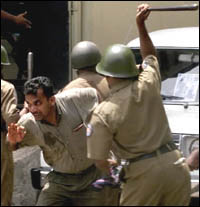Amnesty condemns police killings, ban on demonstrations
[TamilNet, Friday, 20 July 2001, 19:55 GMT]
"The death of at least two people from bullet wounds and the injuring of well over 30 more as a result of police action against a predominantly peaceful demonstration in Colombo on Thursday constituted the use of excessive force on the part of the police," Amnesty International said in a press release today.
The AI also condemned the Government's invoking of the 1981 Referendum Act to ban all protest demonstrations. The Act bans all processions "between the calling of a referendum until after the result is announced, other than Mayday, religious or social processions, and the latter must not contain anything that may affect the referendum result."

"This is an absolute infringement of the rights to freedom of expression and assembly. People of all political persuasions must recognize and respect each other's right to gather peacefully and express their opinions without fear for their safety," said the statement from AI.
The organization said it is "fearful that if these rights are not observed and guaranteed by the state, then the period leading up to the referendum will become increasingly violent and polarized, and result in many more serious human rights violations."
Alluding to the fact that the vast majority of people who took part in Thursday's demonstration were unarmed and peaceful, the statement said: "Amnesty International has no reports of arms being used or shots being fired by the demonstrators. Those who did indulge in violence threw stones from the street. However, the police have admitted using live ammunition, rubber bullets and tear gas. There is also film footage of a police officer handing a large knife to a person in civilian clothes, thought to be a member of the security forces or a member of one of the government parties."
AI also reminded the Sri Lankan authorities of the United Nations Basic Principles on the Use of Force and Firearms by Law Enforcement Officials, which state: "In any event, intentional lethal use of firearms may only be made when strictly unavoidable in order to protect life," and "Exceptional circumstances such as internal political instability or any other public emergency may not be invoked to justify any departure from these basic principles."
"Amnesty International urges the President of Sri Lanka to instruct all law enforcement agencies to strictly observe these principles during the current tense political situation. It also calls on her to ensure that Sri Lanka observes the right to freedom of expression and assembly which will assist in diffusing the tensions."







 "This is an absolute infringement of the rights to freedom of expression and assembly. People of all political persuasions must recognize and respect each other's right to gather peacefully and express their opinions without fear for their safety," said the statement from AI.
"This is an absolute infringement of the rights to freedom of expression and assembly. People of all political persuasions must recognize and respect each other's right to gather peacefully and express their opinions without fear for their safety," said the statement from AI.